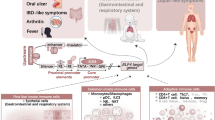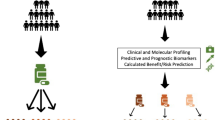Abstract
Background
Genetic and functional studies have associated variants in the NOD2/CARD15 gene with Crohn’s disease.
Aims
This study aims to replicate the association of three common NOD2 mutations with Crohn’s disease, study its effect on NOD2 expression in B cells and its interaction with other IBD-associated genes.
Methods
A total of 294 IBD patients (179 familial IBD, 115 sporadic IBD) and 298 unrelated healthy controls were from central Pennsylvania. NOD2 mutations were analyzed by primer-specific amplification, PCR based-RFLP, and validated with the ABI SNPlexM genotyping system. Gene–gene interaction was studied using a statistical model for epistasis analysis.
Results
Three common NOD2 mutations are associated with Crohn’s disease (p = 5.08 × 10−7, 1.67 × 10−6, and 1.87 × 10−2 for 1007fs, R720W, and G908R, respectively), but not with ulcerative colitis (p = 0.1046, 0.1269, and 0.8929, respectively). For IBD overall, 1007finsC (p = 4.4 × 10−5) and R720W (p = 9.24 × 10−5) were associated with IBD, but not G908R (p = 0.1198). We revealed significant interactions of NOD2 with other IBD susceptibility genes IL23R, DLG5, and OCTN1. We discovered that NOD2 was expressed in both normal human peripheral blood B cells and in EBV-transformed B cell lines. Moreover, we further demonstrated that muramyl dipeptide (MDP) stimulation of B lymphocytes up-regulated expression of NF-κB-p50 mRNA.
Conclusion
NOD2 is expressed in peripheral B cells, and the up-regulation of NOD2 expression by MDP was significantly impaired by NOD2 mutations. The finding suggests a possible role of NOD2 in the immunological response in IBD pathogenesis.



Similar content being viewed by others
References
Xavier RJ, Rioux JD. Genome-wide association studies: a new window into immune-mediated diseases. Nat Rev Immunol. 2008;8:631–643.
Zhang H, Massey D, Tremelling M, et al. Genetics of inflammatory bowel disease: clues to pathogenesis. Br Med Bull. 2008;87:17–30.
Hugot JP, Chamaillard M, Zouali H, et al. Association of NOD2 leucine-rich repeat variants with susceptibility to Crohn’s disease. Nature. 2001;411:599–603.
Wellcome Trust Case Control C. Genome-wide association study of 14,000 cases of seven common diseases and 3,000 shared controls. Nature. 2007;447:661–678.
Hampe J, Franke A, Rosenstiel P, et al. A genome-wide association scan of nonsynonymous SNPs identifies a susceptibility variant for Crohn disease in ATG16L1. Nature Genet. 2007;39:207–211.
Duerr RH, Taylor KD, Brant SR, et al. A genome-wide association study identifies IL23R as an inflammatory bowel disease gene. Science. 2006;314:1461–1463.
Radford-Smith G, Pandeya N. Associations between NOD2/CARD15 genotype and phenotype in Crohn’s disease—Are we there yet? World J Gastroenterol. 2006;12:7097–7103.
Csillag C, Nielsen OH, Borup R, et al. CARD15 status and familial predisposition for Crohn’s disease and colonic gene expression. Dig Dis Sci. 2007;52:1783–1789.
Henckaerts L, Van Steen K, Verstreken I, et al. Genetic risk profiling and prediction of disease course in Crohn’s disease patients. Clin Gastroenterol Hepatol. 2009;7:e972.
Tohno M, Shimazu T, Ueda W, et al. Molecular cloning of porcine RP105/MD-1 involved in recognition of extracellular phosphopolysaccharides from Lactococcus lactis ssp. cremoris. Mol Immunol. 2007;44:2566–2577.
Cobrin GM, Abreu MT. Defects in mucosal immunity leading to Crohn’s disease. Immunol Rev. 2005;206:277–295.
Girardin SE, Boneca IG, Viala J, et al. Nod2 is a general sensor of peptidoglycan through muramyl dipeptide (MDP) detection. J Biol Chem. 2003;278:8869–8872.
Wang Z, Liu T, Lin Z, et al. A general model for multilocus epistatic interactions in case-control studies. PLoS One. 2010;5:e11384.
Yu W, Lin Z, Kelly AA, et al. Association of Nk2–3 polymorphism with Crohn’s disease and expression of Nk2–3 is up-regulated in B cell lines and intestinal tissues with Crohn’s disease. J Crohns Colitis. 2009;3:189–195.
Lin Z, Cui X, Li H. Multiplex genotype determination at a large number of gene loci. Proc Natl Acad Sci USA. 1996;93:2582–2587.
De la Vega FM, Lazaruk KD, Rhodes MD, et al. Assessment of two flexible and compatible SNP genotyping platforms: TaqMan SNP Genotyping Assays and the SNPlex genotyping system. Mutat Res. 2005;573:111–135.
Tobler AR, Short S, Andersen MR, et al. The SNPlex genotyping system: a flexible and scalable platform for SNP genotyping. J Biomol Tech. 2005;16:398–406.
Inohara N, Ogura Y, Fontalba A, et al. Host recognition of bacterial muramyl dipeptide mediated through NOD2. Implications for Crohn’s disease. J Biol Chem. 2003;278:5509–5512.
Cho JH. Significant role of genetics in IBD: the NOD2 gene. Rev Gastroenterol Disord. 2003;3:S18–S22.
Mahurkar S, Banerjee R, Rani SV, et al. Common variants in NOD2 and IL23R are not associated with inflammatory bowel disease in Indian patients. J Gastroenterol Hepatol. 2011;26:694–699.
Inoue N, Tamura K, Kinouchi Y, et al. Lack of common NOD2 variants in Japanese patients with Crohn’s disease. Gastroenterology. 2002;123:86–91.
Vermeire S, Van Assche G, Rutgeerts P. Inflammatory bowel disease and colitis? new concepts from the bench and the clinic. Curr Opin Gastroenterol. 2011;27:32–37.
Ogura Y, Inohara N, Benito A, et al. Nod2, a Nod1/Apaf-1 family member that is restricted to monocytes and activates NF-kappaB. J Biol Chem. 2001;276:4812–4818.
Gutierrez O, Pipaon C, Inohara N, et al. Induction of NOD2 in myelomonocytic and intestinal epithelial cells via nuclear factor-kappa B activation. J Biol Chem. 2002;277:41701–41705.
Muzio M, Scielzo C, Bertilaccio MT, et al. Expression and function of toll like receptors in chronic lymphocytic leukaemia cells. Br J Haematol. 2009;144:507–516.
Petterson T, Jendholm J, Mansson A, Bjartell A, Riesbeck K, Cardell LO. Effects of NOD-like receptors in human B lymphocytes and crosstalk between NOD1/NOD2 and Toll-like receptors. J Leukoc Biol. 2011;89:177–187.
Netea MG, Ferwerda G, de Jong DJ, et al. The frameshift mutation in NOD2 results in unresponsiveness not only to NOD2- but also NOD1-activating peptidoglycan agonists. The J Biol Chem. 2005;280:35859–35867.
Chamaillard M, Philpott D, Girardin SE, et al. Gene-environment interaction modulated by allelic heterogeneity in inflammatory diseases. Proc Natl Acad Sci USA. 2003;100:3455–3460.
Bonen DK, Ogura Y, Nicolae DL, et al. Crohn’s disease-associated NOD2 variants share a signaling defect in response to lipopolysaccharide and peptidoglycan. Gastroenterology. 2003;124:140–146.
Rahman MK, Midtling EH, Svingen PA, et al. The pathogen recognition receptor NOD2 regulates human FOXP3+T cell survival. J Immunol. 2010;184:7247–7256.
Beynon V, Cotofana S, Brand S, et al. NOD2/CARD15 genotype influences MDP-induced cytokine release and basal IL-12p40 levels in primary isolated peripheral blood monocytes. Inflamm Bowel Dis. 2008;14:1033–1040.
Li J, Moran T, Swanson E, et al. Regulation of IL-8 and IL-1beta expression in Crohn’s disease associated NOD2/CARD15 mutations. Hum Mol Genet. 2004;13:1715–1725.
Sabbah A, Chang TH, Harnack R, et al. Activation of innate immune antiviral responses by NOD2. Nat Immunol. 2009;10:1073–1080.
Netea MG, Ferwerda G, de Jong DJ, et al. NOD2 3020insC mutation and the pathogenesis of Crohn’s disease: impaired IL-1beta production points to a loss-of-function phenotype. Neth J Med. 2005;63:305–308.
van Heel DA, Ghosh S, Hunt KA, et al. Synergy between TLR9 and NOD2 innate immune responses is lost in genetic Crohn’s disease. Gut. 2005;54:1553–1557.
van Heel DA, Ghosh S, Butler M, et al. Muramyl dipeptide and toll-like receptor sensitivity in NOD2-associated Crohn’s disease. Lancet. 2005;365:1794–1796.
Comalada M, Peppelenbosch MP. Impaired innate immunity in Crohn’s disease. Trends Mol Med. 2006;12:397–399.
Noguchi E, Homma Y, Kang X, et al. A Crohn’s disease-associated NOD2 mutation suppresses transcription of human IL10 by inhibiting activity of the nuclear ribonucleoprotein hnRNP-A1. Nat Immunol. 2009;10:471–479.
Acknowledgments
The authors thank Tony Lin for his assistant with RFLP genotyping. This work is supported by a grant from the Philadelphia Health Care Trust (to W.A Koltun) and a Surgery Initiation Grant from Pennsylvania State University College of Medicine (to Z. Lin).
Conflict of interest
None.
Author information
Authors and Affiliations
Corresponding authors
Additional information
Zhenwu Lin, John P. Hegarty and Gerrit John equally contributed to this article.
Rights and permissions
About this article
Cite this article
Lin, Z., Hegarty, J.P., John, G. et al. NOD2 Mutations Affect Muramyl Dipeptide Stimulation of Human B Lymphocytes and Interact with Other IBD-Associated Genes. Dig Dis Sci 58, 2599–2607 (2013). https://doi.org/10.1007/s10620-013-2696-8
Received:
Accepted:
Published:
Issue Date:
DOI: https://doi.org/10.1007/s10620-013-2696-8




